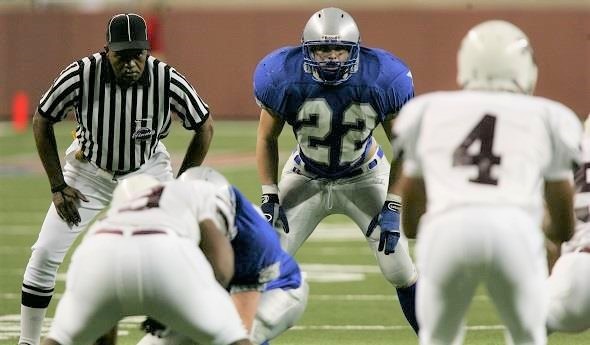
Norris Winner Jewell an Officiating Gem
April 8, 2014
By Geoff Kimmerly
Second Half editor
When Hugh Jewell looks at the list of past Vern L. Norris Award winners, his eyes are drawn to 1992 honoree Ted Wilson of East Detroit and Redford’s Bob Williams, who earned the Michigan High School Athletic Association officials accolade in 2011.
Both rank highly among those who have mentored Jewell, a 40-year MHSAA official who has worked a combined eight Boys Basketball and Football Finals.
Wilson and Williams also are the only past winners from the Detroit area. And that makes Jewell even more honored to become the third.
 A member of Halls of Fame for both the Detroit Public School and Detroit Catholic High School Leagues, Jewell will receive this year’s Norris Award at the Officials’ Awards & Alumni Banquet on May 3 at the Kellogg Center in East Lansing.
A member of Halls of Fame for both the Detroit Public School and Detroit Catholic High School Leagues, Jewell will receive this year’s Norris Award at the Officials’ Awards & Alumni Banquet on May 3 at the Kellogg Center in East Lansing.
Receiving the call to accept this year’s Norris Award led Jewell to recall many who have helped him along the way – and make a day’s worth of phone calls thanking them for the opportunities and knowledge.
“I’ll never forget certain people who saw something in me even back then, in the 1970s and early 80s, when I was getting on my feet,” Jewell said. “Especially as you get older in this, you have to take on the mentality that whatever it is you learned over the years, there’s reason to give back and pass it to younger (officials).
“Now, reaching the point that I have, I think that’s why a lot of younger guys look forward to games (with me). They see my name, and they know I’m going to give them something to take home with them, even if it’s nothing more than a little bit of advice.”
The Norris Award is presented annually to a veteran official who has been active in a local officials association, has mentored other officials, and has been involved in officials’ education. It is named for Vern L. Norris, who served as executive director of the MHSAA from 1978-86 and was well-respected by officials on the state and national levels.
Jewell, 65, has worked mostly in football, boys and girls basketball, and also a few seasons of volleyball and softball. He also officiated college basketball for more than 20 years, reaching the Division II level.
Jewell officiated MHSAA Boys Basketball Finals in 1986, 1989, 1990 and 1997, and Football Finals in 1991, 1995, 2000 and 2006 in addition to a number of Semifinals and earlier-round tournament games.
Not only have his Finals come in three decades, but Jewell believes he is the only official to work MHSAA Basketball Finals at Crisler Arena, The Palace of Auburn Hills and the Breslin Center. He also began his championship weekend run with a 1986 Class A Semifinal at Jenison Field House.
“He has taken advantage of every opportunity to improve himself in his field,” wrote Alvin Ward, a longtime Detroit teacher, coach and administrator and the PSL’s executive director of athletics, in his nomination of Jewell for the Norris Award. “His always positive personality and strong leadership skills have enabled him to become the respected mentor to all who came in contact with him during his prestigious career.”
Jewell graduated from Highland Park High School in 1966 and was decorated with the Combat Infantryman Badge, Bronze Star with Valor Award, Air Medal Award and Vietnam Campaign Ribbon while serving in the U.S. Army from 1968-70.
Jewell then served as a Highland Park police officer from 1970-78, receiving numerous unit and individual citations, and continued as a police/liaison and security officer at the high school and adjoining community college and adult education center.
Jewell earned a bachelor’s degree in secondary education from Wayne State University in 1979 and took his dedication into the classroom two decades later after earning a teaching certificate in social studies in 2001. He taught from 2001-04 at Highland Park Alternative High School, 2004-06 at the Wayne County Juvenile Detention Center’s Ben Carson Academy and from 2006-10 at the Life Skills Center of Metro Detroit.
He has mentored countless sports officials, students and coaches at Detroit area community and neighborhood centers, and taught volunteer officiating classes at Highland Park Community College from 1980-88.
“Hugh Jewell is renowned not only as a top official who has worked a number of Finals events, but also as a positive influence in the officiating community, “ MHSAA Executive Director John E. “Jack” Roberts said. “He’s passed on his expertise to countless colleagues, students and coaches as a clinician and mentor for more than three decades. We are pleased to recognize Hugh Jewell with the Vern L. Norris Award.”
Jewell also is a member of the Basketball Coaches Association of Michigan and Highland Park Community High School Halls of Fame, and has been an active member of his church and the Highland Park Men’s Forum. In addition to multiple Detroit area officials organizations including the Metro Detroit Officials Association, Jewell is a member of the NAACP and American Federation of Teachers.
He also has served as deputy director of the city of Highland Park’s Parks and Recreation Department, deputy superintendent of the city’s Water & Public Works Department and as a substitute teacher/security specialist for Southfield Public Schools.
In addition to passing along his knowledge of games, Jewell had made sure to create a comfort zone for newer officials – remembering when another veteran did the same for him.
Before tip-off of that 1986 Semifinal at Jenison, official Stan Kemp told his young partner, “Don’t worry about a thing. We’ve got this,” Jewell recalled, and Jewell still appreciates how that put him at ease. (Jewell also remembers Kemp mentioning that will a little luck Kemp might be in the NFL someday – and then turning on a game that fall and seeing him wearing the white hat.)
Other best memories include packed Quarterfinals at the University of Detroit Mercy’s Calihan Hall and Ferndale High School – which over the last 30 years have often hosted matchups of the best Class A teams from the Detroit area as they made bids to reach the MHSAA championship-deciding weekend.
Jewell has helped a number of officials prepare for their first “big games.” He delighted in watching one, Lamont Simpson, work an NCAA Tournament game just a few weeks ago. It’s those relationships, part of an incredible legacy, and the opportunities to pass on lessons learned, that have made officiating a giant part of his life’s work.
“Whether it’s in the pregame conference or postgame chit-chat, I have that responsibility to pass those things on,” Jewell said. “I love hearing (from those officials). That why we stay doing this 30 or 40 years.”
Previous recipients of the Norris Award
1992 – Ted Wilson, East Detroit
1993 – Fred Briggs, Burton
1994 – Joe Brodie, Flat Rock
1995 – Jim Massar, Flint
1996 – Jim Lamoreaux, St. Ignace
1997 – Ken Myllyla, Escanaba
1998 – Blake Hagman, Kalamazoo
1999 – Richard Kalahar, Jackson
2000 – Barb Beckett, Traverse City; Karl Newingham, Bay City
2001 – Herb Lipschultz, Kalamazoo
2002 – Robert Scholie, Hancock
2003 – Ron Nagy, Hazel Park
2004 – Carl Van Heck, Grand Rapids
2005 – Bruce Moss, Alma
2006 – Jeanne Skinner, Grand Rapids
2007 – Terry Wakeley, Grayling
2008 – Will Lynch, Honor
2009 – James Danhoff, Richland
2010 – John Juday Sr., Petoskey
2011 – Robert Williams, Redford
2012 – Lyle Berry, Rockford
2013 – Tom Minter, Okemos
High school game officials with 20, 30, 40, 45 and 50 years of service also will be honored at the Officials’ Awards & Alumni Banquet on May 3. Eight officials with 50 or more years of service will be honored, along with 14 officials with 45 years. A 40-year award will be presented to 74 officials. In addition, 92 officials with 30 years and 183 officials with 20 years of experience will be honored. With the induction of this year’s group of 371, the honor roll of officials who have aided young student-athletes grows to 9,416 since the inception of the banquet in 1980. Click to see the full list of this year’s honorees.
Tickets for the banquet are available to the public and priced at $20. They will not be sold at the door. Tickets can be ordered by calling the MHSAA office at (517) 332-5046 or by sending the order form available at this link.
PHOTO: Hugh Jewell officiates the 2006 MHSAA Division 6 Football Final between Inkster and Saginaw Nouvel at Ford Field. VIDEO: Jewell, in 1988, speaks about officiating while working an MHSAA camp.
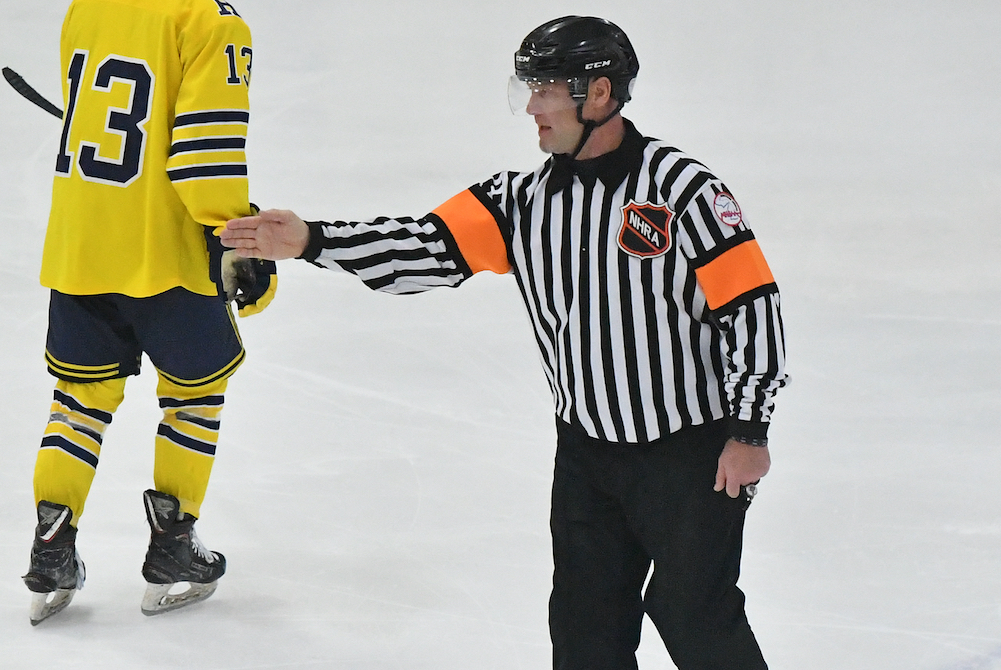
Retired NHL-er Back on Ice to Answer Call - By Making Them
By
Rob Kaminski
MHSAA benchmarks editor
March 16, 2023
The most accomplished skater on the ice during Friday’s triple-overtime MHSAA Division 1 Semifinal hockey thriller between Hartland and Brighton was not wearing the school colors of either team.
In front of a packed house at Plymouth’s USA Hockey Arena, referee Bryan Smolinski was in stripes, just like the rest of his officiating crew.
In his former life, he pulled on plenty of sweaters before lacing up the skates. That happens when one logs more than 1,000 games, tallies nearly 300 goals (274) and close to 400 assists (377) with eight teams spanning a 15-year playing career in the National Hockey League.
So, how did the 52-year-old former star player find himself on the ice last weekend as one of the referees for the pinnacle weekend of this high school season? Good question, even for the man known as “Smoke” during his playing days.
“I was working in youth development programs a few years back and reached out to some Michigan guys I had connections with about other ways to help the game,” Smolinski said. “I called Kevin May just to chat and asked, ‘Hey, how’s your reffing going?’ He said, ‘You know, we’re down a little bit,’ then said, ‘Why don’t you do it?’ I said, ‘Not a chance,’” Smolinski laughed.
Never Say Never
May persisted, imploring his friend to skate with him during a Fall league at Cranbrook in Bloomfield Hills. After eight weeks, once a week, Smolinski had a revelation.
“I’m like, ‘I’m kind of diggin’ this,’” Smolinski said “So, I did all the testing, and the educational part of it, and I really enjoyed it. I got with Danny (DiCristofaro) and his group, and he put me in as much as he could, and I really started to get my feet wet.”
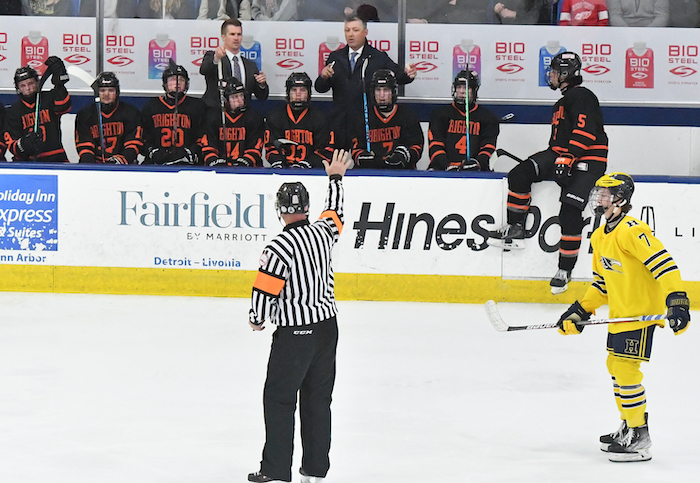 DiCristofaro is the assigner and referee-in-chief for the MHSAA’s Northeast Hockey Referees Association, and he has seen Smolinski’s growth first-hand.
DiCristofaro is the assigner and referee-in-chief for the MHSAA’s Northeast Hockey Referees Association, and he has seen Smolinski’s growth first-hand.
“Obviously he’s got great instincts and a feel for the game, along with a wealth of experience, all of which has allowed him to climb the ladder quickly,” said DiCristofaro. “It’s been a joy to watch his growth as an official.”
Fast forward to last Friday, and there were Smolinski and May sharing duties as referees during the MHSAA Semifinal with linesmen Michael Andrews and Thomas Robbins.
In between, there has been a learning curve that still continues, but the jump to officiating was not quite as daunting as his introduction to the NHL.
“I was scared to death. My first game was against Mario Lemieux. I’m in the old Boston Garden and now I’m playing against these guys and it’s their job, and they’re out there trying to make a living,” Smolinski recalled.
The emotions were not running nearly as frenzied for his first game as an MHSAA official, obviously, yet respect came in a different form.
“I couldn’t pick the puck up, I was breathing heavily; it was Kevin and me doing a two-man game in Brighton,” Smolinski recalled. “There were a few high-end kids playing, and I’m thinking, ‘I’m dying here.’ You know, there’s no training for that first time.”
What that experience did, however, was revitalize Smolinski in a new way. His playing career is well documented, not only in the NHL, but around Michigan. He enjoyed an honor-laden career at Michigan State University from 1989-93 before joining the Boston Bruins (who had drafted him three years earlier) at the end of the ’93 NHL campaign. Even after his final season, with Montreal in 2007-08, he stayed in the game via men’s leagues, or coaching his son, Max.
Smolinski and his wife, Julie, have three daughters: Ashtyn (22), Jojo (16) and Rylen (12), along with Max, whom dad coached for seven years including during a national championship run with a Little Caesars U15 team in 2019. Max, 19, is now playing collegiately at Rensselaer Polytechnic Institute.
So, for Smolinski, officiating offers a new chapter.
“Reffing brought back ... I wouldn’t say love of the game, because that’s always been there; it’s a different side of enjoying the game now. I have no horse in the race, my son’s off to college, my daughters are doing their thing; I wanted to find something new in the game,” Smolinski said. “I’ve coached, and I don’t want to do that. I found this, and I’ve stuck with it.”
Old College Ties
One of the great benefits of athletics at any level are the friendships made. For two kids who met in their first years on the MSU campus and forged a bond that lasts to this day, it’s amazing how their careers reached the pinnacle and have now come full circle.
Wes McCauley, an MSU teammate, is one of Smolinski’s best friends. After numerous years in the minor leagues, McCauley, like his friend, made it to the NHL. But McCauley made it as an official, working his first NHL game in 2003, when Smolinski was nearing the end of his playing career.
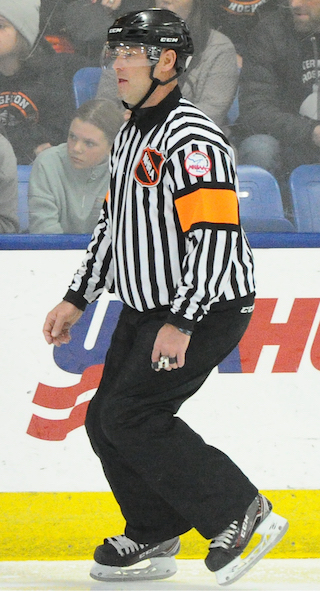 Their games lined up on just a few occasions in the NHL, and the two lobbied hard to have McCauley work Smolinski’s 1,000th career game in his final season with the Canadiens in 2007-08. The request, sadly, was denied by the league.
Their games lined up on just a few occasions in the NHL, and the two lobbied hard to have McCauley work Smolinski’s 1,000th career game in his final season with the Canadiens in 2007-08. The request, sadly, was denied by the league.
On the rare occasions when the friends did share the same ice, less than a handful by Smolinski’s count, it was McCauley who was forced to rebuff any attempts at fraternization. It’s just part of an official’s edict.
“For both of us, it was amazing; it was just great,” Smolinski said. “I’d say, ‘Hey man what’s up?’ and he says, ‘Can’t talk.’ I’m like, ‘What do you mean, we talk all the time.’ Again, he’s like, ‘Can’t talk, get away from me.’ You know, it was just business.”
McCauley then reached the 1,000-game plateau himself in 2018 and is still going strong as a regular selection for playoff duties with nine Stanley Cup Finals assignments, including last year.
So, it should have been natural for Smolinski to go to his old friend immediately for officiating pointers once he joined the ranks, right? Well, maybe not immediately.
“I talk to Wes all the time, but I actually hid it from him right out of the gate because I didn’t want to take his razzing. Eventually it got out, and he was loving it. He started sending me whistles and visors and pants,” Smolinski said, grinning. “And none of it fit, you know, because I’m older and fatter, and he’s so damn skinny. So, I still had to go out and get all new gear.”
Both Sides Now
Having been to the top of his profession, now moving to the other side of that same mountain that his friend McCauley scaled, the respect has grown for those blowing the whistle.
“The preparation for officiating is much more mental,” Smolinski said. “Way more rules oriented. You’re always trying to get away with things that you can as a player; now you have to police that.”
Smolinski has a distinct advantage.
“I know everything they’re trying to do because I’ve done it. I know where you’re going with the puck, I know what kind of breakout you’re trying to do,” Smolinski said. “I have all the instincts, now I just try to stay out of the way and not ruin their game. The most fun is watching the game develop and the ups and downs. For me to be out there and enjoy it with them, that’s the fun part.”
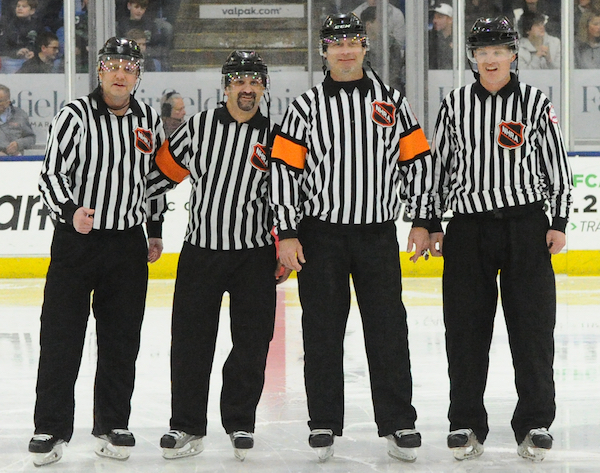 Those who have played hockey at any level have a built-in advantage should they consider the officiating avocation: the ability to skate. Unlike officiating in any other sport, skating is a prerequisite. This makes the pool limited, and almost solely composed of former players. Smolinski offers this advice.
Those who have played hockey at any level have a built-in advantage should they consider the officiating avocation: the ability to skate. Unlike officiating in any other sport, skating is a prerequisite. This makes the pool limited, and almost solely composed of former players. Smolinski offers this advice.
“I prefer sticking with high school because I think there’s more decorum, more administrative structure. Kids are playing for their schools, there’s loyalty there,” said Smolinski. “And there is more accountability. People need report to athletic directors and supervisors. Other levels can be more loosely governed, or a bit more maverick in nature. Moms and dads get involved more, coaches maybe know a little less,” said Smolinski.
He has, in fact, worked a handful of non-school games, and there’s a stark difference.
“I wanted to see what was going on, and I see it first-hand,” Smolinski said. “There are some crazy people and parents out there, and these guys are getting absolutely tortured. I’ve been tortured. There has to be a level of respect for what officials do. I think schools can rein that in a little more. All the guys I’ve met give up a lot of time and work hard because they love to do it and love the game.”
All sports need an assist from school administration and from those who once played the games to keep the officials recruitment moving in the right direction. People like Smolinski can help.
“He clearly doesn’t need to do this, and that’s what makes it so fantastic,” DiCristofaro said. “We need more people who have played – at any level – to do what he’s done and stay in the game as officials.”
Smolinski continues to promote the game in other ways as well. Currently, he is involved in the NHL’s Learn To Play initiative, which aims to inspire youth and welcome more families into the hockey community.
“We work hand-in-hand with the NHL Players Association for player development and industry growth,” Smolinski said. “Ages 5 to 9 are introduced to hockey, get head-to-toe gear and instruction, and meet some former players.”
The idea is to have fun first, which can translate into years and maybe even a lifetime in the sport. It’s a lifetime that has given Smolinski so much and continues to do so as he watches it unfold for others from his new vantage point.
PHOTOS (Top) MHSAA official Bryan Smolinski signals during Friday's Division 1 Semifinal between Brighton and Hartland. (2) Smolinski, a retired NHL standout, communicates with the Bulldogs' bench. (3) Smolinski keeps watch during game play. (4) Smolinski, third from left, with his crew: Michael Andrews, Kevin May and Thomas Robbins.

